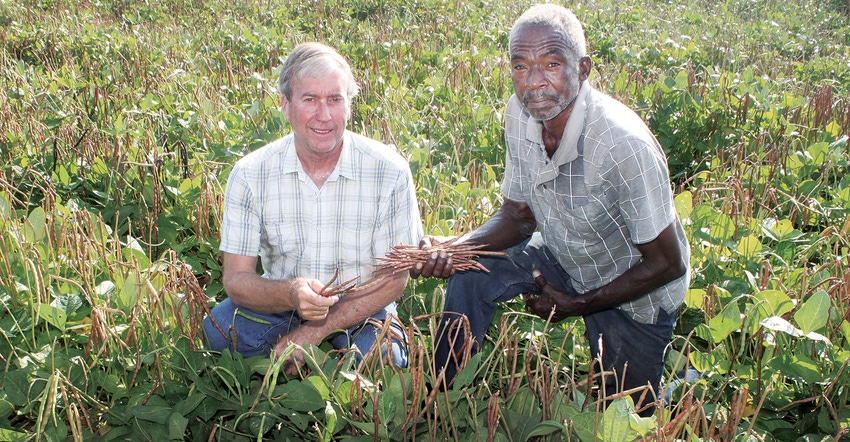
“One needs but to make a casual survey of the cities and towns throughout the Mississippi Delta before he decides that Marks, Miss., is just about the fastest growing, and one of the most prosperous, towns in that rich stretch of territory which has become so famous for its productivity...of what is admitted to be the most fertile soil on the face of the globe.”
That glowing preamble to a local history by an unknown author in the early 1900s described an era that, sadly, came and went during the next hundred years— not just for Marks, but many of the small towns in the Mississippi Delta.
Today, the rich soils are more productive than ever, thanks to better varieties of cotton, soybeans, corn, rice, and more efficient farming methods. But the mechanization, technology, and widespread irrigation that have transformed farming also displaced hundreds of thousands of farm workers across the Delta beginning in the late 1960s. Many moved north for factory jobs, population steadily declined, once thriving businesses became empty shells as big box stores in larger towns took their clientele, and towns like Marks shriveled to shadows of what they once were.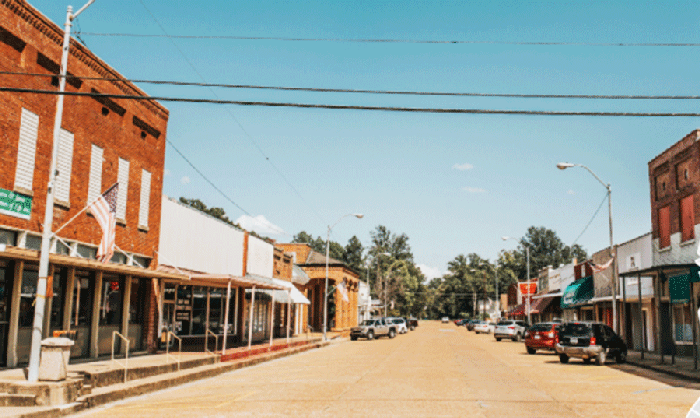
Downtown Marks, Miss. Like many small Delta towns, it has seen an outflow of population over the past several decades as jobs in agriculture dwindled.
“There just are not a lot of job opportunities in Quitman County,” says Jaby Denton, who grew up here and has been farming the fertile land for 35 years. Ice cream ground, it’s called — it will grow anything. But, as with many farmers today, he uses little farm labor on his extensive row crop operation. He drives the tractor himself and the spray rig for weed and insect control.
“There are few jobs on farms any more,” he says. “We have no industry here to offer employment and support a strong economic base. Let’s face it, Marks isn’t going to be another Silicon Valley — Microsoft or Apple aren’t going to come here and hire 500 or 1,000 people.”
As the county’s economic fortunes have slipped lower and lower, too often, Denton says, the tendency has been to sadly shake one’s head at the high unemployment, the large numbers of low income residents, the lack of mentoring for youth of the community, the absence of playgrounds and other amenities.
“Poor kids can be trapped in poverty, a hard life at home, and limited horizons,” he says. “As I got older, I just got to the point that I could no longer accept, ‘Well, that’s just the way it is, and it’s not going to change.’ I was determined to try and make a difference.”
PARTNERING PROGRAMS
Thus, in the fall of 2016, Denton and a friend, Oxford banker Mitch Campbell, launched The Marks Project, to act as an umbrella organization for residents to volunteer in a wide variety of partnering programs aimed at uplifting the community and contributing to a better quality of life. It operates as a tax-exempt entity through the Community Foundation of Northwest Mississippi, which manages 223 donor-established funds in 11 counties.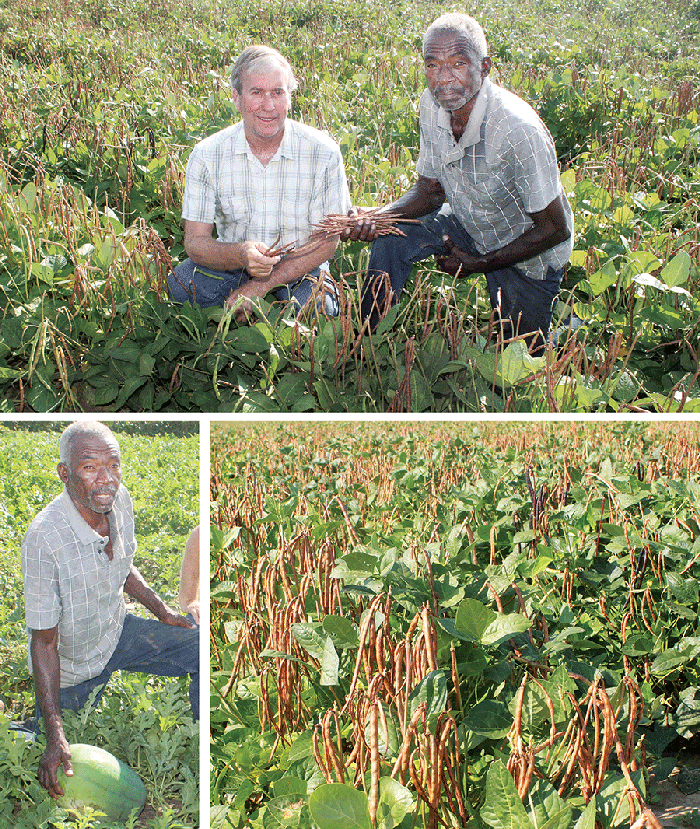
Producer Jaby Denton and Willie Lockett, top photo, check the ripeness of purple hull peas. Denton made 25 acres of rich farm land available for local residents to grow produce to sell or for personal use. Below left, Willie Lockett also grows watermelons and other vegetables on his plot. At right below, most of the peas go to the local Alcorn State University processing plant to be packaged for sale at Mid-South Kroger stores.
While much of the focus is education oriented, Denton also saw potential in the area he knows best — agriculture. “Alcorn State University has had a small vegetable processing plant at Marks for many years,” he says, “and in talking with Percy Baldwin, plant manager, and Eddie Harris, university farm manager, they said they could sell all the purple hull peas they could process to Kroger, but that they couldn’t get a consistent supply to fill the demand.
“Talks evolved from, ‘I’ll grow the peas myself’ to ‘I’ll donate some land for those with limited resources to grow peas.’ The big challenge for growing peas, or almost any vegetable in volume, is not the growing, but the hand labor for harvesting. To meet Kroger’s requirements, peas have to be harvested at peak condition.
“For individuals or families willing to devote the time and effort, there is opportunity for a nice additional income. I saw it as an opportunity for those with an entrepreneurial spirit to invest some sweat equity in growing peas, for which there is a ready market, and other vegetables for their own use or to sell.
“I’m blessed with great Delta soil — three bale-plus cotton ground. There’s more potential money per acre in peas than in cotton, $2,000 to $2,500 gross per acre, with far less input cost than cotton. But labor for keeping them picked on a daily basis is the hangup.”
Denton offered to make available 25 acres of his land, and 13 people signed up to participate. Coahoma Opportunities at nearby Clarksdale encourages this kind of entrepreneurship with small grants to help with seed and inputs.
“Each person has a designated plot of about 2 acres,” Denton says. “They could plant peas, or other vegetables they felt offered sales potential. Each is responsible for tending his or her plot and harvesting on a timely basis.”
A LEARNING EXPERIENCE
Willie Lockett, one of the participants, is growing, in addition to purple hull peas, zucchini, several kinds of squash, okra, butterbeans, watermelons, cantaloupes, sweet potatoes. “It’s a 7-days per week operation — with some blood, sweat, and tears,” he laughs, but says he has been pleased with the results, and agrees that it’s a good project.
“This year has been a learning experience,” Denton says, “and those who continue next year will be able make changes to improve production and efficiency. But we’ve proven one thing: We can grow a lot of peas.”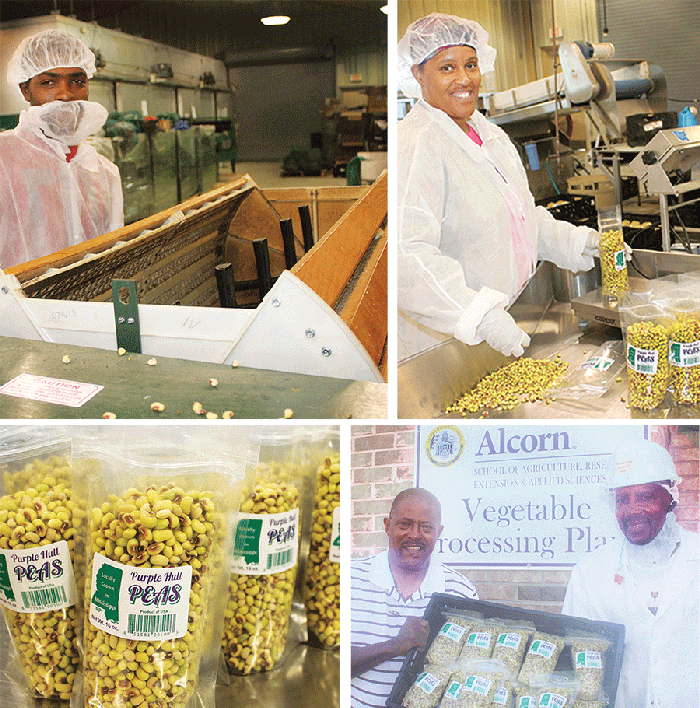
Terrance Emerson, top left, operates the machine that shells peas at the Alcorn State University processing plant. Jackie Wiley, top right, packages the peas. Below left, packages of peas that will be sold at Kroger stores. Below right, Eddie Harris, ASU farms supervisor, and Percy Baldwin, plant manager, with a tray of peas ready for pickup by Kroger.
Eddie Harris, who works with growers in other Delta locations who bring peas to the Marks processing plant, says, “This has been probably our best year for peas. Mother Nature has blessed us with timely rains and good growing conditions. We had our first crop in 2012, and each year volume has been better. The market for commercially-grown peas in the Mid-South is phenomenal, whether fresh market sales or in retail stores."
Percy Baldwin, the plant manager, says peas are shelled, washed, packed in 1-lb. bags, and placed in coolers until picked up. “We use a very strict grading process — we can’t afford to risk losing our reputation for a delivering a quality product that commands a premium price.” Kroger picks up the packaged peas at the plant, from 200 bushels to 400 bushels at a time.
Harris says Alcorn State also has a contract with United Healthcare to provide a wide range of vegetables and melons that are produced at 15 locations in north Mississippi. These are provided to their clients to promote healthier eating. In addition to summer vegetables, he says, “We’ll also process sweet potatoes and some fall greens.”
Besides the economic and family food benefits, he says, “Our goal is to teach these small growers what they need to do to be successful. We’re in the early stages, but we believe there is great potential for individuals and families to have a nice supplemental income through vegetable production.”
BROADER COMMUNITY GOALS
While peas and veggies are generating economic benefits to participating growers, the Marks Project has other ventures going on that have broader goals.
The city of Marks has donated 8.5 acres of land where a city school once stood, with a vision for it becoming a playground and ballpark. The Marks Project has begun fundraising efforts to purchase playground equipment, to construct a community pavilion, basketball courts, restrooms, football/soccerfields, and a baseball diamond.” Kids here don’t have a playground or even a baseball field,” Denton says. “We want to build the park to give them an opportunity for meaningful recreation and play.”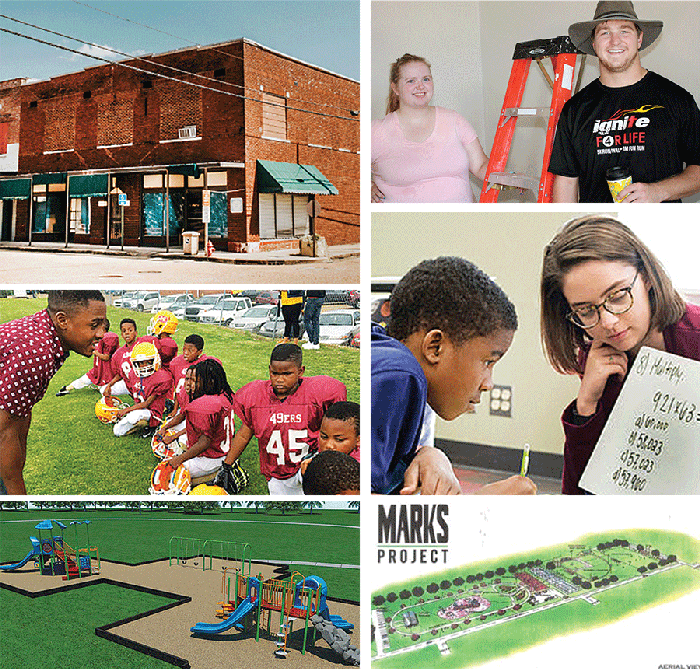
This 8,000 sq. ft. downtown building, top left, originally constructed in 1910 for stores and a Masonic Hall, is being converted into apartments upstairs that will be offered rent-free to teachers in Marks schools, while the downstairs will be a learning/mentoring center. Top right, Patilyn Lowery and Daniel Myrick, both with the Reclaimed Project, are among those working to renovate the building. Middle photos: Activities for youth and academic mentoring. Bottom photos: Plans for a playground on a large vacant downtown site where a school once stood.
In partnership with The Reclaimed Project, a 501(c)(3) non-profit organization “birthed out of a desire to exalt Christ by fulfilling the biblical mandate to serve orphans and the poor,” and with the help of donors, an empty 8,000 square foot building was purchased in downtown Marks and will be converted to housing for six teachers, lodging for volunteer teams, and “a place of ministry, mentoring, and tutoring.”
Daniel Myrick, an Ole Miss grad, Patilyn Lowery, University of Evansville (Indiana), and others have been working this summer to convert the building, which was erected in 1910. The upstairs, which served for decades as a Masonic Lodge, will include individual private apartments with bath, and there will be a large communal kitchen, dining, living area.
“It’s a really solid, well-built structure,” Denton says. “A small town like Marks has a problem attracting teachers, and we’ll offer these apartments rent-free to those who will agree to come and teach in our schools.”
Myrick says, “We want to build relationships with students that allow us to speak to their lives, both at school and in our programs.” In Phase II, the building’s 4,000 square foot ground floor will be converted to a community center, and facilities for tutoring and mentoring students.
YOUTH ENRICHMENT PROGRAMS
Through the Community Foundation of Northwest Mississippi, The Marks Project was awarded a $25,000 grant from FedEx Corp. (Fred Smith, founder and CEO, was born at Marks, but grew up 90 miles to the north in Memphis) to provide a series of summer enrichment opportunities for local children.
These included visits to five major universities in Mississippi, Tennessee, and Arkansas, and various summer activities — a photography/video editing program, music production lab, and summer sports camps, including baseball, soccer, basketball, and football.” Middle school students also traveled to the University of Mississippi for five Saturdays to receive tutoring from university leadership students and participate in athletic activities.
“This experience opened the door to college life for the first time for many of the students,” says Cortez Moss, Quitman County middle school principal, who coordinated the summer program. “We know that giving students a firsthand experience on a college campus increases the likelihood of their attending college. We also recognize that summer can be a time when families don’t have opportunities for learning-related experiences. We’re pleased to have had this program to help fill that gap, and we are thankful to FedEx for making it happen.”
Last fall, a tutoring program was begun for students in the middle school. The success of that effort resulted in it being expanded to the elementary school this past spring. Both programs will be continued, with additional support from the University of Mississippi School of Education. Bryce Warden, of AmeriCorps VISTA, working with the UM School of Education, coordinated the tutoring initiative. Over six Saturdays between February and March, students traveled to Ole Miss for tutoring in reading, language, and math. Ole Miss student athletes, coordinated by the Freeze Foundation, supervised physical activity for the students.
Dr. David Rock, dean of the UM School of Education, has confirmed the university's on-going support for these programs of on-site tutoring on the campus. This program will alternate university tutors working with students in the middle school during the 2017-2018 school year.
The Jumpstart program, a national early education organization that recruits and trains college students and community members to work with preschool children in low-income neighborhoods, will be used at Quitman County Elementary School beginning this fall. The goal is for the youngsters to develop the language and literacy skills they need to be ready for kindergarten, setting them on a path to close the achievement gap.
MAKING A START
In the business sector, Denton says, “There currently is not a single manufacturing job in Quitman County.” The Division of Workforce Development and Community Services at Northwest Community College will begin workforce assessments in the county, along with a job readiness program to identify the potential workforce. They will follow up with basic skills and pre-employment training, which will insure a qualified workforce.
The city of Marks has obtained a property formerly used by the Bunge Corporation, approximately 50 acres adjacent to the railroad, including an administration building and shop facilities. In conjunction with the Mississippi governor’s office and state and local officials, the property is being assessed to to identify potential economic development opportunities.
Options are also being explored for reopening the closed Quitman County Hospital, as well as a potential business opportunity — reopening a community fitness center in conjunction with Youth Opportunities Unlimited.
Next year, 2018, will mark the 50th anniversary of Dr. Martin Luther King’s visit to Marks, Denton notes. “Dr. King wept at the poverty he saw here, and that led to the mule train that left Marks for Washington, D.C., as part of the Poor People’s March. A lot of things have changed in the five decades since Dr. King was here, but we want to renew the effort to make that dream a reality and to make Marks a model for other small Delta communities that have fallen on hard times. The need is great, and resources are limited, but with everyone pulling together we’re at least making a start.”
For more information: http://marksproject.org
About the Author(s)
You May Also Like




